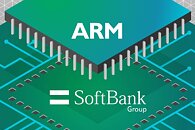Tuesday, August 4th 2020

Arm Co-Founder Doesn't Think NVIDIA Owning the Company Would be in Its Best Interests
Arm co-founder Hermann Hauser recently gave an interview to BBC where he expressed some concerns regarding the prospective buy acquisition from NVIDIA, which has been in talks with Arm owner Softbank towards the IP-designer's acquisition. As Hauser puts it, "It's one of the fundamental assumptions of the ARM business model that it can sell to everybody," Hauser told BCC, "The one saving grace about Softbank was that it wasn't a chip company, and retained ARM neutrality. If it becomes part of Nvidia, most of the licensees are competitors of Nvidia, and will of course then look for an alternative to ARM."
Hauser doesn't think the NVIDIA deal will follow through due to these aspects of the chip design ecosystem, with many Arm clients - such as Intel, Apple, Qualcomm, TSMC, Samsung, among others - being direct or otherwise indirect competitors to NVIDIA. Hauser thinks that Arm would be much better served through a British government intervention in bringing the company back towards the British fold: "The great opportunity that the cash needs of Softbank presents is to bring ARM back home and take it public, with the support of the British government." The Softbank acquisition occurred back in 2016 and cost the company some $24 billion; however, recent estimates from New Street Research LLP placed Arm's valuation at USD $44 billion if its IPO took off in 2021, and as much as $68 billion by 2025.
Source:
BBC
Hauser doesn't think the NVIDIA deal will follow through due to these aspects of the chip design ecosystem, with many Arm clients - such as Intel, Apple, Qualcomm, TSMC, Samsung, among others - being direct or otherwise indirect competitors to NVIDIA. Hauser thinks that Arm would be much better served through a British government intervention in bringing the company back towards the British fold: "The great opportunity that the cash needs of Softbank presents is to bring ARM back home and take it public, with the support of the British government." The Softbank acquisition occurred back in 2016 and cost the company some $24 billion; however, recent estimates from New Street Research LLP placed Arm's valuation at USD $44 billion if its IPO took off in 2021, and as much as $68 billion by 2025.


33 Comments on Arm Co-Founder Doesn't Think NVIDIA Owning the Company Would be in Its Best Interests
All in all, good to see the UK shake up the tired x86 market.
I could have told you that. :roll:
The uncore in all Intel x86 chips has been based on ARM IP since the early days of the Core chips. Many of their iGPUs are based on ARM designs. Intel's newer iGPUs which are in house still contain ARM IP. I'd be very surprised if their new graphics line up don't have significant ARM licensing.
Most of AMD's security stuff on their x86 and graphics cards goes through ARM trust designs.
There are increasing numbers of full ARM (on CPU side) supercomputers. Including exascale designs. Fujitsu's new design is the most powerful / efficient in the world for its workload.
There are very few major commercial compute, graphics, communications or controller chips that don't have ARM IP in them.
They're the most pervasive hardware design IP in the world, and arguably the most influential.
But it's probably just British seller's remorse on this one. The Dude has got a point though, that it should just probably remain a pure licensee. That could really be the reason why ARM is gaining this momentum over x86.
Imagine a world with only ARM-compatible chips where it would be easy for everything to work cross-platform. And anybody could make their own ARM-compatible designer CPUs just like now (but people would actually do it). This parallel universe would never exist if any proprietary chip-company ever buys ARM, especially NVIDIA. But any other company that is interested in selling their own produces would be just as detrimental for that.
Designing a ARM cpu for most is simply checking boxes on features. Its ability to power gate and small add in design with small caches makes it power efficient, not some magic that comes with the ARM logo.
That result was from one high performance linpack run using the SVE vector extension hardware that is only used in that chip. By the same thought process the fastest X should also be great at Y, but its not the case.
So, it may not replace x86, but how much space will it take from x86 where x86 doesn't make sense anymore? For the average consumer or someone who does certain specific tasks for their work, ARM would be the way to go. And these are most people right there.
Look at how phones have gotten more and more features over the years and more of those boxes checked. At this point, the line between phones and PCs are getting blurrier and blurrier. Nobody is asking for a CISC phone and it has made perfect sense for years to use RISC. It has definitely been already battle-tested and it'll only make more and more sense to switch to ARM as time and development on the right checkboxes progress. If you buy what you need and it checks your personal boxes better than x86, I'd strongly argue most people will buy that and not care that x86 has an advantage at being good for everything. People have specific needs and that's exactly how ARM may make x86 irrelevant or at least relegate it to the ones who really need that advantage of x86 you describe.
That said I'm not sure on the original conditions where when Arm sold to SoftBank, but without that majority shareholding you don't control jack anymore.
Some don't see the limits, like a friend of mine, sold on Apple ,she is truly content with what she's already using.
Apple will just dilute the Mac brand into big performance phones, why have two OS after all.
Some software innovation sound like a dream come true but don't pan out, like steam Os.
It's unix based, so already much more user friendly in my opinion than what Windows has. But I'm generally a unix / linux guy.
Apple could make something really good with this move, if it pans out. Improve their own products and image and also elevate the industry by showing how to do ARM well in the PC / Laptop sector. So if it really turns out to work better (which Apple is betting on), I think the adoption by others will be very quick.
I really wonder what interests with Nvidia you have because your choice of word against other brands is so harsh and click-bait while your are being so soft when it is
nvidia.
Also, you should take a look at Amazon's latest in-house ARM server chips ... they give Intel an absolute hiding, and beat EPYC first gen in many metrics.
ARM, if it doesn't have the hardware to perform X or Y function built in its performance is horrible, or it simply will not run. How many original Arm CPU phones wouldn't run flash despite being used extensively at the time? It run just fine on almost every computer from old to new?
en.m.wikipedia.org/wiki/Jazelle
Java was/is another one. Supported on essentially every X86 platform, but the specific hardware had to be added to ARM cpus.
Planned obsolescence by virtue of evolving software. You want to buy a computer that is only good for 2 to 3 years before games, streaming services, applications, etc stop working?
I guess developing software for ARM is like developing software for consoles. You need to keep the hardware in mind more and optimize to its capabilities. This is not even a bad thing, in my opinion. Just another way to make software. It all depends on software in the end and how well developers will be able to make it. Apple is making strides on that front. It also seems like it will become incredibly simple to port x86 apps to ARM automatically and make them run almost just as good on ARM. This is what Apple does really well with Rosetta 2 on the ARM Mac Mini Dev kit, as leaks have shown.
And to finish, look at the problems x86 development has had, especially with Intel? ARM is way ahead of the curve when it comes to performance increases throughout the years. To the point where Apple feels more comfortable to develop its own chips and not have to rely on even a company like Intel that can't deliver on its promises. Here's a good summary on that (starts at 6:56):